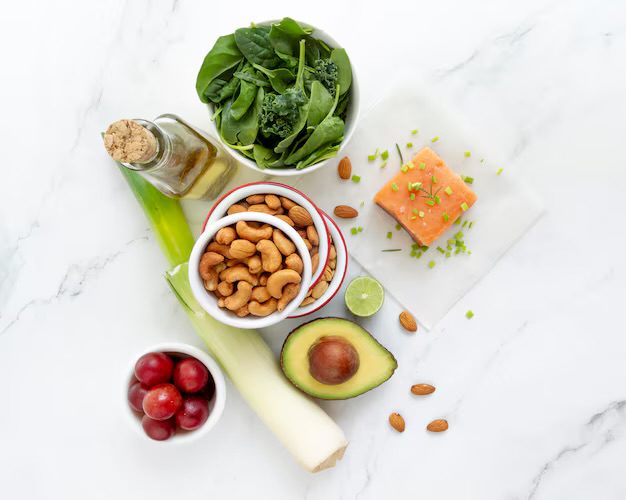This content is for informational and educational purposes only. Always consult a qualified healthcare provider.
Last Updated on December 27, 2024 by Grace Oluchi
Still scared of fats? Can’t blame you though, people hear the word, and start hyperventilating (Kidding ; ) but you do get the point. For years, fats have gotten a bad rep, especially for people who want to lose weight. They’re told not to eat them, however not all fats are created equal. While saturated and trans fats can have negative effects on one’s health, healthy fats are essential for our well-being.
That is to say, you don’t need to stay away from fats, you just need to eat healthy fats. Two of the most important types of healthy fats are omega-3 and omega-6 fatty acids. These are the sources of fats to include in your diet, without worrying about gaining those surprising 10 pounds.
However, remember that weight gain still balls down to calorie intake, not necessarily the type of food you eat. Therefore, you could eat these “safe foods” and still gain weight if you’re not watching your calorie intake.
That said, this article will help you understand why healthy fats are essential for your health, what they are, and their food sources.
📋 Table of Contents
What are Omega-3 and Omega-6 Fatty Acids?


Omega-3 and omega-6 fatty acids are two types of polyunsaturated fats. They are called “essential” fatty acids because out bodies can’t produce them on their own, so we have to get them from what we eat.
Omega-3 fatty acids are found primarily in fatty fish, nuts, and seeds. They are anti-inflammatory and play a very important role in maintaining heart health, brain function, and fetal development during pregnancy.
Omega-6 fatty acids on the other hand, are a type of fat that is present in certain foods, including vegetable oils, nuts and seeds, and supplements. Omega-6 fatty acids are pro-inflammatory and play a role in heart health, inflammation reduction, and skin and hair health.
Benefits of Omega-3 fatty acids as a part of healthy fats
Some main benefits of omega-3 fatty acids are:
- It supports your heart health by reducing triglycerides and regulates blood pressure
- Improved brain performance; better memory retention, increased ability to learn
- It may reduce the risk and/ symptoms of depression and anxiety
- Reduces inflammation which could aid in the reduction of chronic disease like heart disease
- It may offer protection against brain diseases like Alzheimer’s
- Supports fetal development during pregnancy
Benefits of Omega-6 fatty acids as a part of healthy fats
Omega-6 fatty acids also have numerous benefits to offer you. Such as:
- They support your heart’s health by reducing inflammation and improving blood lipid profiles, and lower blood pressure
- Reduce inflammation, which can reduce the risk of chronic diseases such as diabetes, arthritis and cancer
- It can help maintain healthy skin and hair by reducing inflammation, promoting moisture retention, and support the growth of new skin and hair cells
- It can help with brain development
- Supports the immune system by reducing inflammation and promote the production of antibodies
- It may help reduce period cramps, bloating and breast tenderness associated with PMS
- Reduce the symptoms of eczema and psoriasis
- Prevent and improve diabetic neuropathy
The Importance of Balancing Omega-3 and Omega-6 Fatty Acids
While both omega-3 and omega-6 fatty acids are essential, it is also important to balance both of them. If your diet has too much of omega-6 fatty acids and is too low in omega-3 fatty acids, it can lead to inflammation and increase your risk of chronic diseases. It’s very important to maintain a balance between these two, so you can keep your health in check.
Let’s talk food sources
Food Sources of omega-3 and Omega-6 Fatty Acids
Some top foods rich in Omega-3
- Flaxseeds
- Chia seeds
- Avocados
- Fatty fish (salmon, sardines, mackerel)
- Walnuts
- Eggs
- Yoghurt
- Canola Oil
- Kale
- Soybeans
- Milk
Omega-6 rich foods
- Vegetable oils (sunflower, corn, soybeans)
- Walnut oil
- Almonds
- Tofu
- Hemp seeds
- Peanut butter
- Safflower seeds
- Pumpkin seeds
- Sesame seeds
- Meat and poultry (chicken, beef,pork)
- Eggs
- Cashews
Check out this article on basics of macros and building a balanced plate

